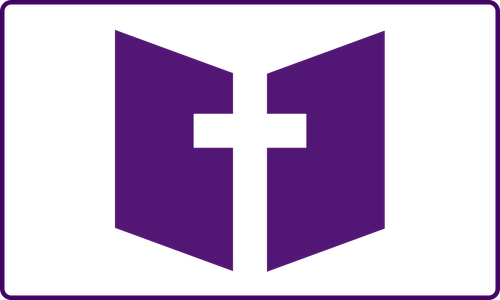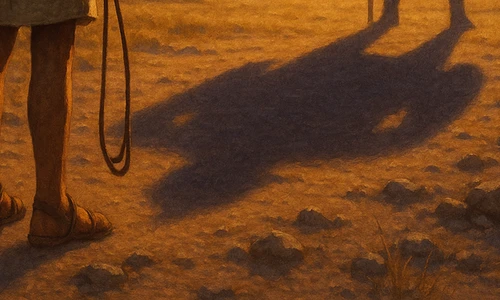Before we begin, let me spoil the ending: no, Malachi wasn’t wrong. This is a story of Jesus’s disciples asking that question and getting a serious, reflective, glorious response.
Hundreds of years before Jesus was born, Malachi wrote,
“Behold, I [God] will send you Elijah the prophet before the great and awesome day of the Lord comes.”
So one day Jesus calls Peter and James and John to walk with him a bit, up to the top of a mountain. There, Jesus is transfigured, and the three disciples see Moses and Elijah talking with him.
Peter tries to make a grand gesture; he’s interrupted by the voice of God Himself from Heaven; Jesus comforts them in their fear; and the four go back down the mountain, with Jesus instructing them not to tell anyone about the vision until after He is resurrected.
On the way, one of them (I’m betting it was Peter again) pipes up with a question:
“Why do the teachers of religious law insist that Elijah must return before the Messiah comes?”
This is a weird question for two reasons.
First, it’s weird because it doesn’t appear to follow from the experience they just had. Didn’t they just see Elijah? Shouldn’t their concern for Elijah to come first have been eliminated by the vision?
Second, it’s weird because Jesus’s answer suggests that the scribes and Pharisees for once have it right. At this point in their journey, I have to imagine that Peter and James and John thought they were going to get some unique insight into why the other teachers were wrong again.
I wondered why they would ask this and be wrong: surely they know the Scripture that says Elijah must come back first (Malachi 4:5). Maybe they don’t, although that seems unlikely given the Jewish obsession with waiting for Messiah. They’re fishermen, sure, but they’re also Jews.
But maybe they’ve thought it all the way through, and they’ve come to the conclusion that Malachi must have been wrong. After all, they haven’t seen Elijah, but they have seen Messiah, so something must be wrong. Asking Jesus why one of God’s prophets was wrong is a gutsy move, but far better to learn than to sit in ignorance. From their perspective, one of these four options must be true to resolve the conflict:
- Malachi’s prophecy was indeed incorrect, and Messiah could come before Elijah returned. This option appears to be what is happening at this point in the story. Which brings into question all the Old Testament prophecies from Moses to Malachi, especially the ones that speak of Messiah.
- Jesus is not the Messiah. Which brings into question their last few years following this man around and listening to his teaching and believing in His Lordship. Also, it means Jesus directly lied to them, which is bad for three reasons: first, they’ve wasted their time and believed a liar, which is frustrating and humiliating; second, false messiahs have a tendency to bring down the Roman government on Judea’s shoulders; and third, a false messiah moves, in C.S. Lewis’s terms, from “Lord” to “liar” or “lunatic”—or worse, demon—meaning they were in fact a demon’s disciples, not a place you ever want to be.
- The Pharisees’ interpretation of Malachi is wrong. This is what the disciples clearly think is happening, since they must assume that Malachi wasn’t actually incorrect (that’s a good rule: whenever you don’t understand something in Scripture, assume the Bible is right, and figure out where your interpretation has failed). Note that they don’t ask, “Why does Malachi say Elijah must come first?”; they ask, “Why do the teachers say Malachi must come first?”
- Elijah has in fact come and they missed it.
This last option, it turns out, is Jesus’s answer: John the Baptist has come in the spirit of Elijah, which is what Malachi meant. It resolves the tension of the previous three answers, and it shows that both the Pharisees and the disciples were half-right and half-wrong. And it confirms once again that Jesus is the Messiah, the fulfillment of thousands of years of prophecy and promise.
So we have our resolution, but it occurs to me to wonder why they asked this question.
Clearly, it was most immediately prompted by the appearance of Elijah himself along with Moses. (I always wonder about this scene, given the obvious symbolism of Moses/Law, Elijah/prophets, and Jesus/Messiah, but I’ll leave that wondering for another time.) They saw Elijah, and they asked about Elijah.
I suppose it’s possible this question just popped into their heads as they were contemplating the incredible sight: “Wait, didn’t the teachers say Elijah had to come first, and yet here we see Messiah? Hey, Peter, you ask him.” Or maybe they’d been discussing it amongst themselves for a while: “Peter, we just saw Elijah. You gotta ask him now. Yes, you. Because you’re the guy who asks him things, that’s why.”
It seems most likely to me that they’d heard about it from their peers who walked with other teachers.
In that time, there were many teachers who had schools of disciples. For example, we know that John the Baptist had disciples like Jesus did (John 1:35 and others), and we know that Paul studied under Gamaliel (Acts 22:3). Surely Jesus’s disciples spoke with their peers in other schools to compare notes. As they’re talking one day, they discover this bone of contention: “My teacher says Elijah has to return first. Can you go ask Yeshua about that, because Simon here thinks he’s literally Messiah, but Gamaliel said that’s not possible. One of them has to be wrong, and I don’t think either one of them has ever been wrong before.” Maybe they try to reason it out themselves, both in their internal discussions and between schools.
And so on this night it comes bubbling to the surface. What better time to ask?
But instead of the tremendous jibe the disciples were surely expecting—”Haha, those Pharisees, always getting stuff wrong. Jesus will set them straight!”—Jesus asserts that the other teachers are correct, just blind.
Yes, they have correctly interpreted some straightforward prophecy: there are no cosmic secrets hidden in Malachi 4:5. However, they need to open their eyes and see that John the Baptist is the “Elijah” who has come to prepare the way of the Lord.
Actually, now that we consider the solution in terms of blindness, we should not be surprised at how it turned out. Jesus said very plainly that He came not to change the law or the prophets but to fulfill them (Matthew 5:17). Perhaps, with the benefit of two thousand years of hindsight, we could nudge Peter (sorry, Peter) to ask a slightly more informed question: “Rabbi, how is it that your death and resurrection will fulfill Malachi 4:5, since the word of the prophets cannot pass away, but it doesn’t appear that Elijah has come, and yet the other rabbis are confident that Malachi was talking about Messiah, whom we have confessed is you? What are we missing?”
Jesus gently opens his disciples’ eyes, and through Matthew, He opens ours as well.



